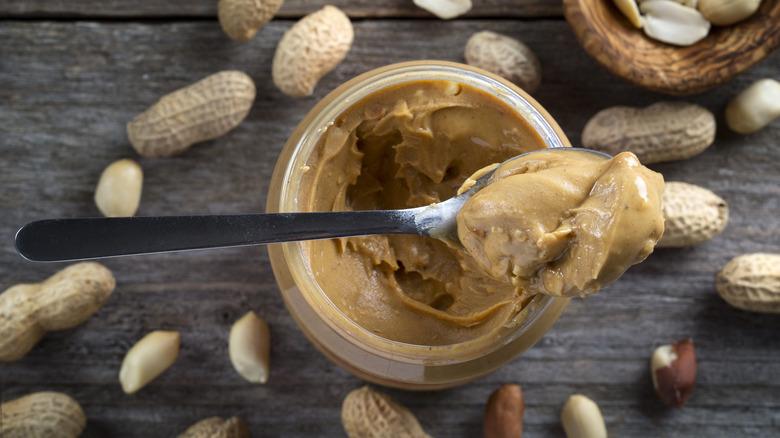Help Ward Off Heart Disease With This Popular Sandwich Spread
What you're smearing on your favorite sandwich may be protecting your heart health in the long run. Obesity, hypertension, hypercholesterolemia, prediabetes, smoking, and a lack of physical activity are all factors that can make us vulnerable to heart disease, explains the National Heart, Lung, and Blood Institute. A person's risk continues to climb if they have a combination of these health conditions or lifestyle risk factors. While there's no one food item that can completely eliminate your risk of heart disease, peanut butter is one popular sandwich spread that may offer you some degree of protection.
More people eat peanuts than any other nut worldwide, according to 2022 research published in Frontiers in Nutrition. Small as they may be, peanuts are bursting with fiber, protein, magnesium, folate, and many more essential nutrients. They also contain monounsaturated fatty acids (which are considered healthy fats) as well as antioxidant chemical compounds, such as polyphenols, which are known to help fight off cardiovascular disease.
How peanut butter may lower your risk of heart disease
A handful of peanuts is one thing, but is a spoonful of peanut butter just as effective in protecting against heart disease? In a 2009 longitudinal study published in The Journal of Nutrition, researchers examined whether nut and peanut butter consumption influenced cardiovascular disease risk in over 6,000 women diagnosed with type 2 diabetes. The researchers defined a single serving size of nuts as 1 ounce, and a single serving of peanut butter as 1 tablespoon. The study findings showed that women who ate five or more servings of nuts or peanut butter each week were at a 44% lower risk for cardiovascular disease compared to women who rarely ate nuts or peanut butter.
Among the many different compounds in peanut butter that may contribute to this relationship, the sandwich spread's omega-6 fatty acid content may be one of them, explains WebMD. While some experts caution that consuming greater amounts of omega-6 than omega-3 could increase the risk of blood clots, inflammation, and more, numerous studies have shown omega-6 fatty acids to support cardiovascular health. "Omega-6 fats are not only safe but they are also beneficial for the heart and circulation," Dr. Dariush Mozaffarian, an assistant professor of medicine at Harvard-affiliated Brigham and Women's Hospital, told Harvard Health Publishing.
Unhealthy ingredients in peanut butter to be mindful of
Studies have produced varied results when it comes to peanut butter intake and its effect on heart disease risk. Some research demonstrates a relationship solely between peanut butter intake and reductions in triglyceride levels, while other studies showed no connection between peanut butter and reduced cardiovascular and coronary heart disease risk (via Frontiers in Nutrition). In a 2015 research paper published in the International Journal of Epidemiology, the study team found that people who ate 10 grams or more of nuts and peanuts each day were less susceptible to cause-specific mortality, including cancer, diabetes, neurodegenerative disease, and cardiovascular disease. This link was not seen in connection with peanut butter, however.
Experts have noted that the additives in many commercial peanut butter products can have opposite effects on our heart health. Added salt, sugar, and fully hydrogenated vegetable oils enhance peanut butter's flavor, and allow it to keep for longer (although you may want to think twice before storing peanut butter in the pantry). However, the added hydrogenated oils boost the sandwich spread's saturated fat (or unhealthy fat) content, which can subsequently raise "bad" cholesterol while lowering "good" cholesterol — a potential recipe for heart disease, according to a 2022 research assessment published in Foods.
To make sure you're choosing the healthiest peanut butter options, here are our suggestions for the 14 healthiest brands of peanut butter you can eat.



